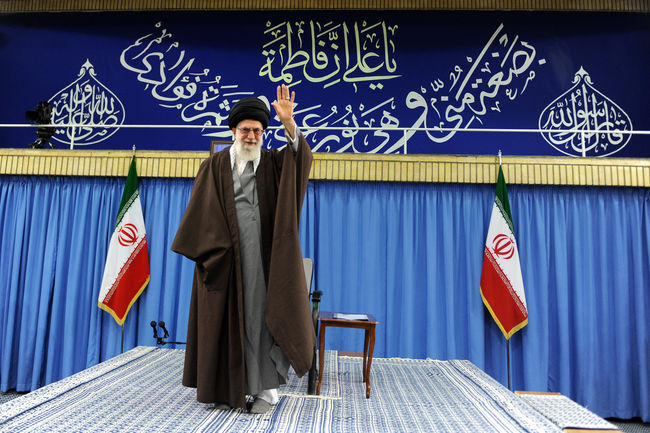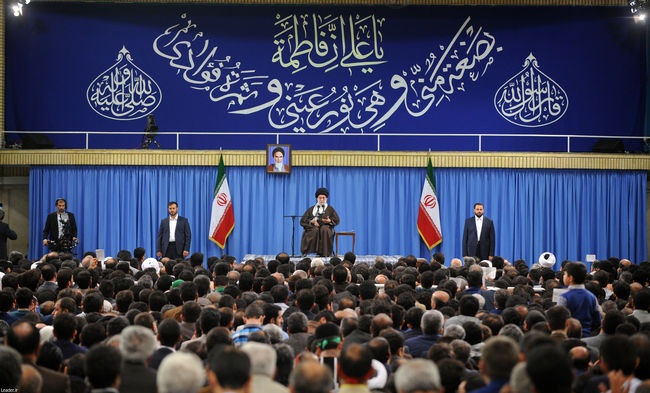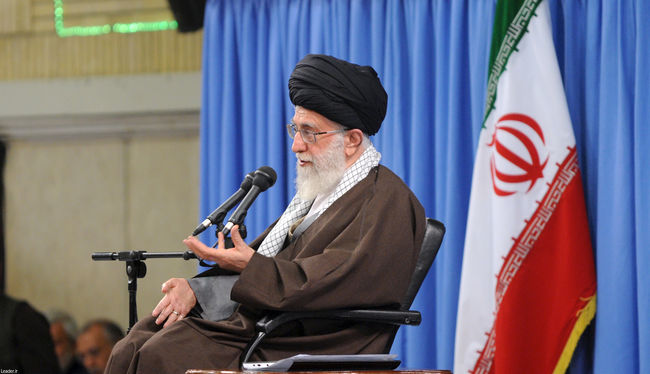Leader of the Islamic Revolution Ayatollah Seyyed Ali Khamenei in a meeting with a group of eulogizers and cantors on Wednesday on the birth occasion of Hadhrat Fatemeh Zahra (AS), the daughter of Prophet Mohammad (PBUH), said bringing up practical issues about the life of the Prophet's Household is instrumental in increasing the depth and influence of eulogies. Highlighting the enemy's persistent use of all tools for countering the Iranian nation and the Islamic establishment, Ayatollah Khamenei said: "In the present and future complicated world, we have to take advantage of all political, economic, social and defense tools to strengthen Iran's position."
Offering his felicitation on the auspicious birthday of Hadhrat Fatemeh Zahra (PBUH), Ayatollah Khamenei described eulogy for the Prophet's Household as a source of honor, saying: "The phenomenon of eulogy and signing religious songs to such a general extent and using such profound concepts, is a specialty of the Shia community, and there is room for students and researchers to conduct studies on scientific ways of expanding and increasing the depth of this phenomenon."
Ayatollah Khamenei said understanding and expressing the lofty and brilliant status of Hadhrat Fatemeh (PBUH) is really impossible, adding: "However, as far as the lifestyle and behavior of that Venerable Lady are concerned, there is a great deal of points to express and learn lessons from."
The Leader of the Islamic Revolution said "being the daughter of the Great Prophet" of Islam and "being the wife of God’s Selected One [Imam Ali (PBUH)]" are indicative of the high status and the greatness of Hadhrat Fatemeh (SA), adding: "'Training Two Masters of Heaven's Youths', purity of the 'spirit and the essence of life' as well as 'piety and cleanness of heart' are among the properties of that Venerable Lady that can be achieved in mankind's individual and social life through fear of God and persistent monitoring [of one’s behavior and actions]."
Ayatollah Khamenei recommended eulogizers and poets to take into consideration these practical points and facts in "their poems, eulogies and tributes," adding: "[Frequent] mention of spiritual statuses [of exemplary people] leads to affection and illumination in one’s heart, but it's not sufficient and effective [on its own] and it is necessary that practical lessons from the life of the [Shia] Imams (Peace Be Upon Them) be expressed through every podium in a artful way in order to pave the way for [accepting] the guardianship and practical followership of the Prophet's Household."
The Leader of the Islamic Revolution said religious poems and eulogies should pay due attention to existing issues, noting: "The Arrogant system, [which is] based on 'political, economic, cultural and military bullying' spares no efforts for harming the Islamic Republic and the Iranian nation and this reality should not be ignored."
Noting that the enemies of Iran's 1979 Islamic Revolution are resorting to all clapped-out and advanced tools in their hostility with Iran, Ayatollah Khamenei said: "They take advantage of 'dialogue, economic transactions, sanctions, military threat and any other means' to push ahead with their objectives, and we should also have the capacity for confrontation and defense in all these areas."
The Leader of the Islamic Revolution pointed out military strength as the main means of bullying against the Iranian nation by the Arrogant powers. Ayatollah Khamenei then went on to pose a fundamental question, asking: "In this jungle-style circumstances in the world, if the Islamic Republic merely goes after negotiations and economic exchange and even science and technology without having defense capacity, will even small governments not allow themselves to threaten the Iranian nation?"
Ayatollah Khamenei strongly criticized those who describe the future times and the future world as the world of negotiations and not that of missiles, saying: "[Our] times are times for everything; otherwise, the nation will see its rights trampled on easily and overtly."
"If this claim has been made due to lack of knowledge it is one thing, but if it arises from knowledge, it would amount to treason," added the Leader of the Islamic Revolution.
Ayatollah Khamenei mentioned the display of advanced and precision-guided missiles developed by the Islamic Revolution Guards Corps (IRGC) as a source of happiness for those nations that have been wronged by the United States and the Zionist regime of Israel, and are at the same time unable to do anything about it.
"The enemies are constantly upgrading their military and missile capacity. Under such circumstances, how can we say that the time is gone for missiles?" asked the Leader of the Islamic Revolution.
Ayatollah Khamenei drew a parallel between this rhetoric and the remarks made by some officials in the post-revolutionary interim government, who said that Iran had better give back the F-14 fighter jets it had bought from the United States because “they are of no use to Iran.”
"At that time, we stood firm and we made revelations [in this regard] and a while later, when [the former Iraqi dictator] Saddam [Hussein] invaded Iran, it became clear to what extent we needed these defense tools," said the Leader of the Islamic Revolution.
Ayatollah Khamenei reiterated his approval of diplomacy and political negotiations as a tool, except in a few exceptional cases, saying: "Publicity should not be made in such a way that as if we are opposed to talks. We say that we should negotiate strongly and with vigilance so that we would not be deceived."
Regarding the Economy of Resistance, Ayatollah Khamenei said: "Repetition of words and slogans becomes boring. Therefore, it is time for 'practical steps and action' to improve the country's economic conditions and people's livelihood."
In his recommendations to the eulogizers and cantors of the Prophet's Household, the Leader of the Islamic Revolution also highlighted the necessity of countering enemies' efforts for undermining the beliefs of youths, adding: "Efforts are made to undermine youths' belief in 'Islam and the effectiveness of the Islamic establishment' and even create the impression that the survival of the Islamic Republic is impossible."
"Of course, for 37 years, in parallel with different conspiracies, enemies have been speaking about the impossibility of the survival of the Islamic establishment, but the elected establishment of the Iranian nation has grown from the nascent sapling it was at the outset of the [Islamic] revolution to become a towering and evergreen tree, and this reality shows that the Islamic establishment has enough potential to grow, prosper and become stronger and this will be seen more and more with every passing day," said Ayatollah Khamenei.
The Leader of the Islamic Revolution described future outlook of the country as brilliant and joy-inspiring, while giving recommendations to eulogizers and cantors by saying: "Through [reciting] substantive poems and artistic performances, turn your audience into hopeful, industrious and effective people, while considering guiding people and awakening and boosting their insight as your most significant task."
At the beginning of this meeting, a number of eulogizers conducted eulogies in praise of the virtues and characteristics of Hadhrat Fatemeh (PBUH).



